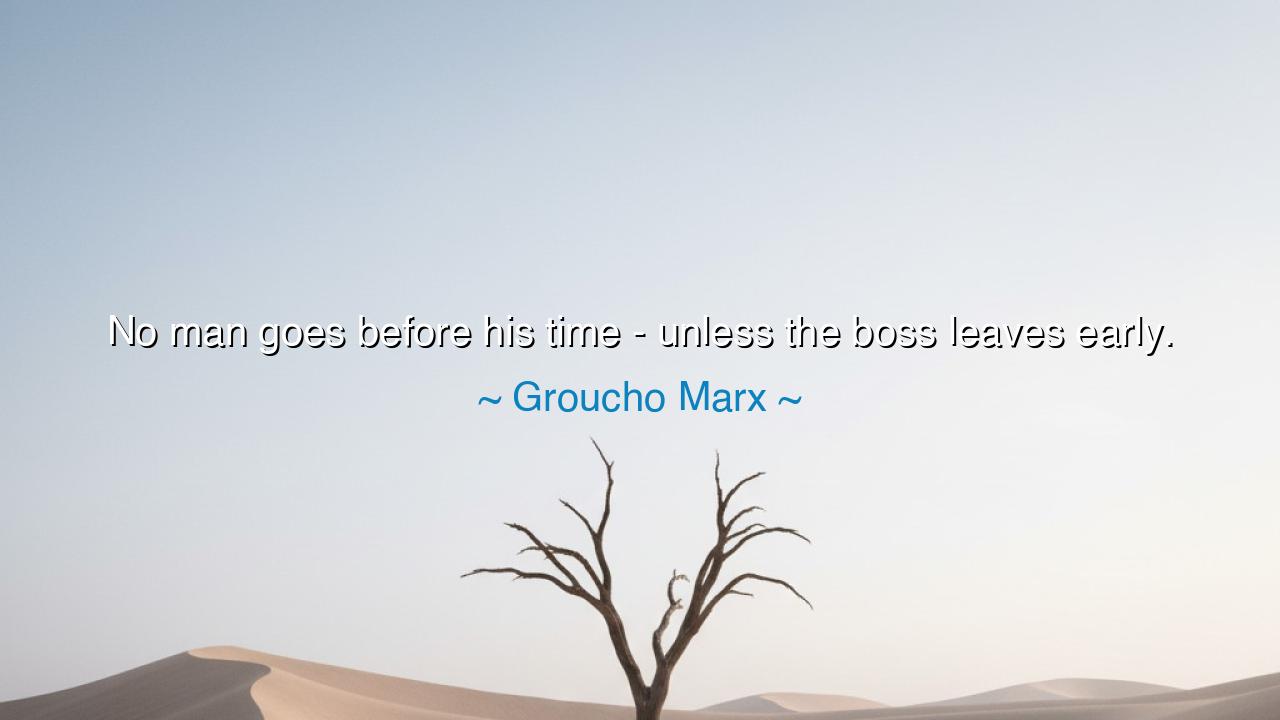
No man goes before his time - unless the boss leaves early.






The words of Groucho Marx—“No man goes before his time—unless the boss leaves early.”—come clothed in laughter, yet beneath the veil of comedy lies a subtle truth about human nature, authority, and freedom. In his jest, Groucho reveals the eternal dance between duty and desire, between the weight of obligation and the yearning for release. For in the workplace, as in life, men are often bound less by the ticking of the clock than by the gaze of those who hold power.
The ancients, though they knew nothing of timecards or office hours, understood this principle. In the courts of kings, in the camps of generals, in the forums of Rome, men labored long not because the hour demanded it, but because the eyes of their leaders were upon them. When Caesar lingered in the Senate, so too did his men. When the emperor retired, the halls emptied. Thus, Groucho’s quip is not merely a modern jest, but a reflection of an ancient truth: authority shapes behavior, often more than conscience or reason.
History offers vivid illustrations. In the building of the Great Pyramids, thousands of laborers toiled under the gaze of overseers. But when those masters departed, surely the pace slackened, the tools rested, and men sought shade. So too in the factories of the Industrial Revolution, where workers’ backs bent long under the watchful eye of supervisors. Yet the moment the manager’s boots no longer echoed upon the floor, shoulders lifted, voices rose, and stolen moments of rest appeared. The presence of authority binds; the absence of authority frees.
And yet, there is a deeper wisdom in Groucho’s line. It is a satire not only of bosses but of human dependency upon example. Men and women alike often look outward before they act, measuring themselves by what others permit rather than what they truly desire. The quip reminds us of how rare true independence of spirit is—that most will not leave before their time, unless they see another blaze the trail first. In this way, the “boss” becomes a symbol, not just of authority, but of permission.
Beloved listener, the meaning is clear: Groucho’s words are not only a jest at the expense of bosses and workers, but a mirror held up to the human condition. We often chain ourselves not with iron, but with expectation. We wait for others to move before we dare to move ourselves. We rise when the leader rises, we fall silent when authority enters the room, we conform to patterns not because they are right, but because they are watched. The joke is funny because it is true, and it is true because it is universal.
The lesson for us is twofold: first, beware of being ruled too much by appearances. Do not live your life waiting for permission from others to act. If the work is done, if the duty is complete, do not be afraid to step away, whether or not the “boss” has departed. And second, if you are a leader, remember how deeply your example shapes those who follow. Your actions are more powerful than your words; if you demand diligence but practice indulgence, you teach hypocrisy, not virtue.
Practical wisdom demands this: seek integrity whether or not eyes are upon you. Work faithfully, not because a boss is present, but because the work itself deserves it. Rest joyfully, not because others allow it, but because rest is part of the rhythm of life. And if you lead others, walk in the manner you wish them to follow, for their steps will often mirror yours.
So let Groucho Marx’s jest remain with us: “No man goes before his time—unless the boss leaves early.” Laugh at it, yes, but also learn from it. For humor often reveals what solemnity hides: that authority influences, that example leads, and that true freedom comes only when one no longer waits for another to move first. In laughter, wisdom often hides its sharpest blade.






AAdministratorAdministrator
Welcome, honored guests. Please leave a comment, we will respond soon